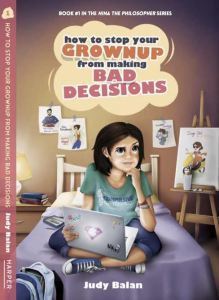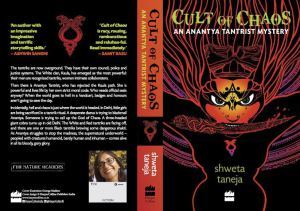Kiran Manral's Blog, page 52
February 10, 2015
Judy Balan on her latest book How to Stop Your Grown Up From Making Bad Decisions
Judy Balan has written two bestselling books, Two Fates and Sophie Says and is back with her latest offering, a book for young adults called How To Stop Your Grown Up From Making Bad Decisions.
Here’s a short Q & A with her about her book.
What made you choose YA as your genre for your next book?
It wasn’t a conscious decision, really. I don’t think in labels when I decide to write a book. I usually have ideas popping up in my head every few hours and I know that an idea is worth pursuing when it begins to seriously distract me from real life – in this case, I could hear Nina’s (my protagonist) voice very clearly in my head and I loved her. It just so happened that she was an eleven-year-old, so the YA bit happened by default.
What are the challenges of writing YA fiction, when compared with writing fiction for adults, were there specifics you had to keep in mind? And also, how difficult was it to write in the voice of a 11 year old?
Actually, I just wrote the way I would write for adults but less consciously, I suppose. In fact – and this might sound loola – I switched fonts from Times Roman to Chalkduster and suddenly, all the uptightness had gone and I was a tween all over again. And once I nailed Nina’s voice, the book just wrote itself.
What next from this series?
I’m currently working on the second book in the Nina The Philosopher series and umm, it’s a little past deadline (hope my editor isn’t reading this). In the second book, Nina is older, sassier and as usual, finds herself dealing with a whole bunch of incorrigible grownups, not to mention, oodles of ‘tweenache.’ And yes, fingers crossed for these two books to do well so it can become a full-fledged series. Having grown up on Blyton, the thought of having my own series is such a high.
Are you also working on other fiction for adults?
Yes, I have a couple of projects lined up in that department. Will get started on it once I’m done with the second Nina book. I’m trying something new, so mucho excited!

From Blogging to Publishing. A discussion with Ravi Subramanian and me at WIN 14
February 3, 2015
My Parle G Parent Quotient post for last week: A Nelson Mandela moment
The offspring has a chapter in his English Reader titled Home on the Veld. The chapter is an extract from the autobiography of Nelson Mandela, and speaks about his childhood in a village called Qunu in South Africa.�� While to all purposes, the extract painted a lovely picture of an idyllic childhood spent in the bosom of nature, and the joys of living in the rondavels as one family, with plenty of cousins and aunts living together, the offspring was a little concerned about the number of little niggling things that I did not even notice or register.
���Does he not go to school?��� he asked me, because nothing about school was mentioned in the extract. All there was, was about being a herdsman and learning stick fighting and felling birds with sling shots and drinking milk straight from the udders of the cows and such like.
I was sure there was school involved somewhere in his childhood, I told the offspring. Perhaps this extract was about his early years, and when he grew a little older, he did get into school and get himself an education in addition to his non-negotiable duties as a herdsmen.
Read the rest of the post here.

My Parle G Parents Quotient post for the week: How to get your child to speak more about the school day
Sometimes it seems to me that the only thing I seem to be doing with the child all day is volley firing questions at him. What did you do at school today, what is the homework today, did you eat your tiffin box, why didn���t you eat your lunch box, what did you do in school today, how did you get that mark on your hand, why did you get this remark in your diary, ad infinitum, ad nauseam. At the end of it all, I���ve convinced myself that the CBI lost a top notch interrogation specialist when I took up this mommying gig.
Read the rest of the post here

January 27, 2015
Honoured to be on the Planning Board of the Kumaon Literary Festival
Interview with Shweta Taneja, author of Cult of Chaos and a signed copy giveaway
Shweta Taneja and I go back a long time, from the time I was a freelance writer and she worked with Femina. Ergo, I was quite delighted to know that Shweta, too, had followed the call of her heart and had now become a published author, that too in the most fascinating genre ever. And because I am such a sucker for signed copies of their books from authors, I have yet one more signed copy giveaway of Shweta’s book right here. Details on how you can win yours at the end of this post.
Here’s a bit about her:
Shweta Taneja is an author with a weakness for the occult, the eccentric and the oral traditions of Indian mythology. Her latest book Cult of Chaos is a tantrik detective fantasy based in Delhi. Find more of her at www.shwetawrites.com or @shwetawrites
Why a book on the dark arts and tantricism? What fascinates you about this genre?
I have always been curious about supernatural and paranormal creatures, not from the Western myths but those that are part of the Indian folklore and myths. Who are they? What kind of clothes do they wear, why are they evil? Why are they scary to us? How do they have sex, how do they communicate? What do they talk about? I love to poke into their territories and worlds through speculative fiction.
For me, these creatures of the dark are the ���others��� who we as humans are scared of. We don���t know them, their behavior is different, they have different cultures, rules, language, clothes, faces, skin colour. But the way we react to them, shows us who we are. How would you react to someone from a different community, caste, colour, gender? I quite like exploring this otherness and the reactions to it, this tension between ���we��� and ���them���. And the genre of speculative and fantasy fiction is particularly suited to this. Through alternative realities, we can try and show a mirror to our own reality and reactions. Make fun of ourselves or critique ourselves. And in our world, the modern world, where censorship and intolerance is ever increasing, we needs more supernatural tales to make us question ourselves.
The darkness of tantrism is fascinating at another level too, for I feel dark stories are in many ways much closer to reality than all the polish of civilization. Tantrism for example has many transgressive rituals through which they try to break the bonds society has on us. Take an example of eating your own shit. It���s a disgusting idea to you and me who are products of our society, but to a baby, newborn, it���s okay. How do we start building these limits around us? And who are we if not the restrictions the society puts on us? It���s only through walking this subterranean, subconscious paths of selves, the taboos and the transgressions that you get to see the truth of humanity, stark and terrible.
Tell me a bit about how the protagonist came to you and how you researched/ built her up.
It���s quite funny how ideas come to you. Anantya emerged from my first attempt of a novel, a fantasy saga in which a young girl is abused and seeks vengeance from those who���ve wronged her. The story failed, perhaps because I spent a lot of time building the world and not the story itself. But Anantya remained, a remnant of a failed novel, an angry protagonist.
She was there as I explored the possibility of combining two genres I love the most���fantasy and detective in some way. I didn���t want the usual vampires and witches stuff, which is quite European in its origins. Instead, the fantasy I wanted to explore needed to come from the roots of our country, its belief systems and its core. Not from Indian mythology either as there���s so much of that around already. So I decided to jump into the folklores, the occult and oral histories seeped in our villages. After I���d taken that decision, writing on tantriks was an obvious choice. I am amazed at how everyone you talk to, in cities or villages, anywhere in the country have a tantrik story with them or know a person who has employed a tantrik for a problem. They���re not talked about in the mainstream but at the edges, in hushed conversations, one to one.
Then one day, I was sitting in a corner of my husband���s rather comfy office and reading a book when it all came together and I suddenly found out that Anantya is an occult detective. Once I knew that, the ideas came so fast that I couldn���t even find a paper and pen and instead scribbled it on the whiteboard in front of me, taking a photograph, rubbing it off and scribbling some more. Eleven scribbles later, I had the beginnings of Cult of Chaos.
What made you decide to write a book, what was that moment when you decided you must give it a shot?
I don���t remember any one instance really, but after a few years of chasing stories as a journalist and editor, I realized that I wanted to tell stories instead. I didn���t start immediately however, something that I perhaps should have. From the desire to write, it took me five years of a Master���s degree, two failed novels, millions of procrastinating moments, blogs on stuff, to get to actually writing. And once I did, I haven���t stopped! In the last five years, I���ve written six books, four of which are published and two lie at various edit levels. The longest of this, my latest Cult of Chaos, touched 1,20,000 words at manuscript stage.
How long did it take you to research and write this, and how do you see this evolving as a series perchance?
Once I had the initial idea, instead of just making everything up, I started to research, because I wanted to keep it a layer away from the real. For about a year, I explored practicing tantriks, shamans and superstitions in folklores, village tales, oral stories. I must���ve read about forty scholarly books, innumerable papers, pop books sold on the streets on tantrism, and articles. All of this, pop and scholarly research and written and oral histories went into the making of this book.
I won���t call the book real, since I took many liberties with rituals and dramatic rendition of it in the book, but it���s a shade away from the real. There���s an echo of reality, of the way black magic happens in the book, which makes it more fascinating.
To answer your second question, the series will explore and go indepth into the tantrik folklores that swim in our country. But each of the book stands alone in the sense that one mystery is solved in each. I���ve signed a three-book contract with HarperCollins, which means you get to see atleast three adventures of Anantya Tantrist, but my feeling right now is that it would be about five books before I’ve explored the complete world. Other than the world itself, I would be exploring Anantya���s violent past in the next two books, as well as her evolution from this angry young lady to maybe someone who resolves stuff and moves on. Frankly I don���t know where she will head to next. She���s got quite a mind of her own as you can see!
What is your writing routine like?
Since I work on my own and am my own boss, I am quite disciplined. I begin a story by fleshing out the plot and figuring which medium it���s meant for���graphic novel, novel, short story or game. Then I develop the plot on little chits of paper, spread across a table. This plot keeps on thickening till I am satisfied and want to begin the story. The writing of scenes itself is magical and creative but I stick to the plan of writing a particular section per week. If I miss a week, I write two sections in the following week. This disciplined approach has helped me to finish books and be more efficient before I get bored of them. The first half of my workday goes into writing and the second into answering emails, researching, relaxing. I take the weekend off only if I���ve finished my week���s work and forget most of the holidays.
Tips, advice, words of wisdom for looking to get published writers, with a novel in them or sitting in their computers?
There���s no better teacher to writing that writing itself. The process of writing, putting one word after another, will help you bring the story in your head onto paper. Write. If you can���t do it well, keep doing it. Read the masters, the accomplished novelists to see how they express the world. Your control over language as well as your finesse in expressing an idea will improve only through the process of writing. One word after another. Every now and then, I do write about the tricks and business of writing on my website under a section called Witchery of Writing here : http://staneja.com/writing/
��And one lucky person can win a signed copy giveaway. Here’s what Shweta wants you to do.
“I love occult stories. I itch to tell them and itch to listen to new ones. Tell me a tantrik or occult story you���ve heard, real or imagined in the lands of this country. Add the story in the comments below and the best one, or the most fascinating one will get a copy of Cult of Chaos signed by me and sent with love. Go on, storytellers!
Pan India addresses only.”
Contest ends February 11th and Shweta’s decision will be final.
LATEST BOOK
Cult of Chaos, an Anantya Tantrist mystery
Anantya Tantrist is a spunky 23-year-old, gaali-spewing, beedi-smoking fearless tantrik who solves crimes in Delhi. When she’s not solving crime, she’s having a drink at Bedardi Bar. Cult of Chaos is the first of her dark adventures where she solves a case in which little girls are being sacrificed in a tantrik ritual.
www.shwetawrites.com/anantya
BUY A COPY
Amazon: http://goo.gl/ux7ORI
Flipkart: http://goo.gl/llQAMS

January 26, 2015
My Parle G Post for this week–I wish him enough
The one thing that the child does get is enough ��� Not more not less. But just enough.�� I thought of the philosophy of enough this morning, when out of the blue, completely unbidden came the anecdote I had read many years ago about a mother and daughter bidding each other farewell forever at an airport, and each told the other, I wish you enough. And that, the narrator told us, was from a prayer where you wished the other enough and not more, because enough would make you appreciate what you had and know that the lack of it would be painful, and lack would make you sorrowful and excess, in turn, would make you unappreciative of what you had.
I wish you enough.
Read the rest of the post here

January 23, 2015
Storified Twitter chat with DNA
My yowoto post for the week: Ten things they didn’t tell you about parenting a tween
There really should have been a manual warning you about all of this!
The offspring, as you would definitely know, if you���ve been reading this column for a while now, is no longer a cute under 10, but has moved swiftly and surely into the realm of tweendom which comes loaded with all the baggage of riding the first waves of burgeoning hormones, but is still tinged with the innocence of a childhood yet to be shed completely.
From non-stop giggling over ���seks��� jokes which he can���t yet understand but has picked up from the bigger boys in the playground and knows he must repeat at top volume in a crowded supermarket to get himself all the attention he needs while his mother looks beseechingly at the tiles under her feet to open up and swallow her right now or hoping against hope that this could be the moment she finally perfects self-combustion, to slipping a terrified hand into mamma���s when crossing a terrifying junction of honking traffic, the tween is a mass of bravado and fear, of precociousness and innocence, of contradictions that keep redefining how one parents every single day, until one is reduced, as I am, to now parenting by wire.
Read the rest of the post here.












